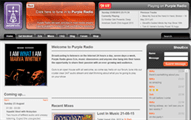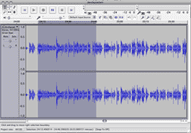How and why you should become a radio DJ part 2
Wednesday, August 26, 2015
by Tat
In the previous Trackhunter blog post we talked about how and why you should start your own radio show. The second part of this article on radio DJing looks at the more practical aspects of that process. When getting into radio production there are various things you will need to consider, those mostly being around preparation, promotion, playlist, personality and podcast - what we'll call the 5 Ps. All of which help make your radio show that bit more polished and stand out from among the others out there. Of course you radio show does not have to have all of these things and can just be for you and your friend's pleasure. You can make it as much fun/work as you want it to be.
Radio collective or go solo?
Before we get onto the 5 Ps it is important for you to decide what kind of show you want. Do you want to be part of a collective or deliver your own stand alone broadcast? There are a few pros and cons to take into account for either option.
Collective
Firstly being part of a radio station or collective has the benefit that you can extend your networks, as well as discover like-minded people. Another big bonus is that with an established station the groundwork of promotion has been done for you. The chances are that there is already an audience tuned in and they may listen to your new show. By getting involved with a collective of DJs on air you also get a support network. Depending on how big and established a station is will help on what kind of support you will get. So technical issues like getting online and broadcasting for the first time might be easier if a helpful soul is there to help you. The negative aspects of getting involved with a collective station may not be an issue. Firstly you may have to pay a monthly fee to help keep the station running, or it may be optional. Running an online station can be costly with everything from licence fees, bandwidth, data storage, promotion and web hosting all adding up. You will probably have to commit to a regular schedule that might be weekly, fortnightly or monthly, usually that is up to you to decide how much you want to commit to. If you wanted to join an established popular station you might have to settle for a time slot that wouldn't be your first choice. The rule of thumb is that the longer you stay on a station, the more chances you have to move into better, prime time slots. There also may be rules you have to adhere to, you may have to talk (some shows allow music only shows) or reveal the track names you are playing (which is a good thing to do anyway). If your music taste is a bit on the risky side, such as explicit hip hop, you might have to play very late at night, although there is no such thing as a post 9 o'clock watershed on the web, or leave the station all together.
Going solo
Running your own independant show is the less attractive option than a collective station. It is a good option if you are less interested in playing to strangers and building a crowd and just want to entertain close friends and the odd stranger. Naturally you can broadcast when you want and for how long you want. Using a tool like Ustream or even having a Google Hangout you can post a few messages on your social media network and then just go live. There are plenty of inventive ways you can get online to DJ from the comfort of your own house without spending any money. The downside is that unless you are a well-known DJ it is unlikely to help build your name or help you extend your music network. It is certainly worth considering this option if you are nervous about taking the plunge and joining a DJ collective.
When you do finally decide to take your DJ skills online to deliver your own show there are a few things you must take into account.
Preparation
As the old saying goes, 'fail to prepare, prepare to fail'. So before getting online whether alone or through an internet radio station you need to run a test. It is important to carry out a system check before going online purely as it will prevent any stress once you are up and broadcasting. Firstly, make sure you have set all of your equipment up right. Check your microphone levels to make sure you are not drowning the music out. It is important to remind you to always remember to turn down the music when you speak. Also make sure that your music is limited to maintain a steady output level, if not you could find yourself delivering distorted music across the web. It is fine to have the music on loud whilst you play, but if it is distorted in your house, then it will sound even worse at the other end on a laptop or tablet. Make sure that you have checked and double-checked the audio settings for delivering the music online. If a station is limited to a certain bit-level, such as 192kbps and you start playing at 320kbps you might just crash their station.
Promote
This goes without saying, but I'll say it in case, but if you are planning to deliver a radio show let friends and followers know about it. You might want to keep it a secret for the first few shows, as you decide whether radio DJing is for you. Once you are settled with the idea of playing online then letting people know you are DJing can only improve your show. Friends and followers can contact you for shout outs and track requests, they may tell their friends, if your show is good enough, before long you might find yourself with a following. Once you are happy with your show you can create a Facebook group to post updates and podcasts. Once you get your show up and running you can create other imprints to help promote and archive past shows such as a blog and Twitter feed.
Playlist
DJing in a club can be very different from DJing on the radio. In a club you may be more restrictive in what you play, especially if your primary role is to beat mix and keep people dancing. On your radio show you can be more liberal as to what you play. Nevertheless it is a really good idea to playlist all of your tracks in advance. A typical two hour show might contain anything from 15-20 tracks depending on how much you talk. You may need to list the tracks you are playing onto the station website, so by having it all typed out in advance it will remove any unnecessary stress. It will make your show more relaxed and run smoother, especially if you have friends messaging you on the site, via social media or text requesting shoutouts.
Personality
Having your own radio show is an opportunity to let your personality come out as a DJ. Not every DJ is interested in trying to be a personality, after all the priority is to play and promote other people's music. However, that is no reason to stop you bringing a bit of your own self to your radio show. It can add depth to your radio show and make listeners engage with your show more if they can relate to your warmth, humour and knowledge. The temptation is to sound monotone and droll with the intention of coming across cool and serious. That is fine, if you want to do that then it will still appeal to listeners, especially if you play a certain sound such as techno, ambient and drone. Nevertheless it is important to remember that when starting your own radio show you do not have to conform to a certain way of delivering it. Many specialist shows, especially hip hop, drum and bass, house and electronica can conform to a prescribed way of deliverance. There are no hard and fast rules, it is your show and therefore you are in charge of how it plays out, just do not feel obliged to pigeonhole yourself. Also remember that it is quite common to not like the sound of your own voice when recorded. Many speakers think they have a terrible voice, as long as you speak clearly and naturally, it does not matter how you sound. The chances are you sound perfectly fine.
Podcast
Finally, this goes without saying, but if you do deliver a live radio show then remember to record it. There are plenty of free tools that can help you do this, Audacity being one of the best. The benefits of recording and uploading your show are many. It means that anyone who missed your show can catch up on it later on and share it with friends. It becomes content for your social media profiles and depending on the station you are working with, can be replayed when there are no live shows.
Finally
Getting online and running your own radio show is not as hard as you imagine. There are plenty of guides to help you set yourself up technically and no shortage of stations you can join. Rather than list specific ones here, it is better to approach the ones you may already listen to, do not be afraid to try. Also ask your friends and networks which stations they listen to, spend some time doing your research and see whether you think you would fit in and offer something good to their roster. Whilst the biggest hurdle for many DJs is that of speaking on air, but with a good quality microphone and a bit of dutch courage you will probably find it is no different than speaking to your own best friend. Given any luck they will be tuned in once you start to broadcast.
Get tracks to play on your radio show using Trackhunter






